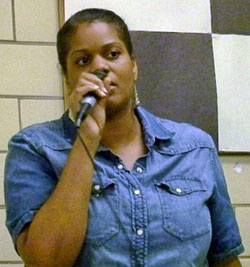Building for people’s power
A step forward toward building people’s power was taken in Philadelphia when activists met on Sept. 26 in the western part of the city. The People’s Power Assembly had been preceded by a series of speakouts during the summer where community residents addressed the issues that concerned them.
The speakouts were sparked by a march on May Day that went through what the organizers called the “repression center.” Activists marched by the construction site of a so-called “Youth Study Center,” better described as a youth detention center; a new Immigration and Customs Enforcement office; and a new police headquarters, all within a few blocks of each other in West Philadelphia.
The May Day march was so successful in engaging people in the area that organizers followed with speakouts on different key issues in the community. Issues like unemployment, lack of health care and education, the destruction of small, family-owned businesses that provided stability in the community, and cuts in General Assistance were some of the main topics repeated by many people during the speakouts.
Interesting was the fact that many residents wanted to do something about those issues, but felt that nobody else in the neighborhood was interested in joining the effort. Sadly, this is a symptom quite pervasive not only here but across the country. It is the ruling class, through its media and other institutions, that has instilled the false idea that people have no power, that their only power is exercised through their votes every four years.
So the next step was to organize a meeting, a People’s Power Assembly, where all those who wanted to fight back could meet each other.
That was the first goal of the West Philly PPA — to unite for struggle. That was what brought out residents from this predominantly African-American community. The assembly was chaired by Patrice Armstead, the main PPA organizer and resident from the West Philly neighborhood. Erin Morales, a young poet and activist, opened the meeting by reading one of her moving poems dedicated to Mumia Abu-Jamal and the injustice of mass incarceration and solitary confinement. Other speakers were Anthony Monteiro, professor of African-American studies at Temple University and longtime Philadelphia activist, who spoke about unemployment and prisons. Betsey Piette, from the International Action Center, spoke about education.
Several issues were raised by the audience, who in general spoke of the necessity of fighting back and not remaining passive in the face of possible gentrification, lack of fresh produce in the community, and foreclosures, among other attacks against the poor. A followup meeting will be scheduled soon to take up a course of further action.


